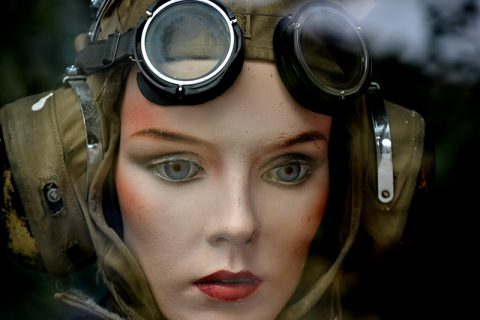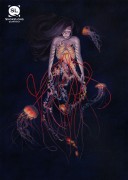Your story offers a very savvy understanding of detective fiction—incorporating some of the elements of the genre but then playing with them in unconventional, unexpected ways. Are you yourself a big fan of crime fiction?
I read mysteries from time to time, mostly Agatha Christie, but I’m in no way an authority! What fascinates me is the overall idea of a detective. They have a keen understanding of human desire and yet remain emotionally detached or elusive. They carry the burden of perceptions and insights that the rest of the characters—and readers—can’t yet see. They are driven by a singular need to know.
The story helped me explore someone who can crack open the interior lives of others but can’t do the same for himself—as if all of the men in this story are their own greatest puzzles.
Do you find your fiction is primarily driven by character—by a focus on those interior lives you mention—or by plot? Or are the two really separable in that way—one more in control than the other?
I’m learning time and again that character is key, and that knowing a character deeply means knowing their motivation, and knowing their motivation means driving a plot. My stories usually begin with a concept, like the detectives, but an engaging concept can carry a story only so far—if the story you want to write is ultimately about the inner lives and follies and victories of ordinary people. Whenever a story flounders, I almost always come back to character.
There’s something that particularly interests me about fiction that comments on other fiction, which I think this story does, intentionally or not. In addition to your own fiction writing, you also review regularly for The Rumpus and teach too. How does your work as a reviewer and as a teacher inform your own fiction?
Reviewing a book forces me to articulate how it’s working, and thinking about other’s work in this way has been some of my best training. I make a point to seek out debut novels, because that’s what I’m working on, and so these writers and I are on a companion mission.
The only better training for me is teaching. I learn an incredible amount from my students, and what makes teaching wonderful is that you can’t anticipate the questions and reactions that come up around the workshop table. Again, it forces articulation. My understanding of a concept broadens and I have to bend my way of thinking.
I love that phrase “companion mission.” Who’s a new first-time writer that you’ve recently enjoyed and learned something from? And have you actually tried to apply what you’re learning to your own writing?
A friend of mine, Abby Geni, just had her first novel come out: The Lightkeepers. She treats and captures setting and the natural world with such detail and reverence. I’d also love to mention Joseph Scapellato, whose first collection, Big Lonesome, comes out next year and will be followed by a novel. Some of his work unabashedly embraces the surreal and at the same time retains its heart, which is not an easy feat. I seem to absorb influence rather than directly applying it. So these qualities, for example—rendering a world, risk-taking—will settle in the mind with so many others and do their work there.
What can you tell us about your own first novel?
My novel concerns a young college dropout who’s approached by his very real 52-year-old self. This visitor’s life has turned out terrible: he’s a crude, bitter alcoholic, and he wants his younger self to do things differently, but his demands come at a cost. It’s called Great Days Are Ahead of You, and right now I’m searching for an agent.
What do you see as the distinct pleasures and distinct challenges of writing short fiction on the one hand and a longer narrative on the other?
What I love about novels is that sense of journey. A reader commits several days, weeks, or months to this story. It’s a thrill for me to open a novel and think: someone has been here before. Someone has taken this journey and sent back a message that says: are you ready? You don’t have to pack as much food and clothing for a short story. You can make the trip and be back again.



 The core workshop of SmokeLong Fitness is all in writing, so you can take part from anywhere at anytime. We are excited about creating a supportive, consistent and structured environment for flash writers to work on their craft in a community. We are thrilled and proud to say that our workshop participants have won, placed, or been listed in every major flash competition. Community works.
The core workshop of SmokeLong Fitness is all in writing, so you can take part from anywhere at anytime. We are excited about creating a supportive, consistent and structured environment for flash writers to work on their craft in a community. We are thrilled and proud to say that our workshop participants have won, placed, or been listed in every major flash competition. Community works.